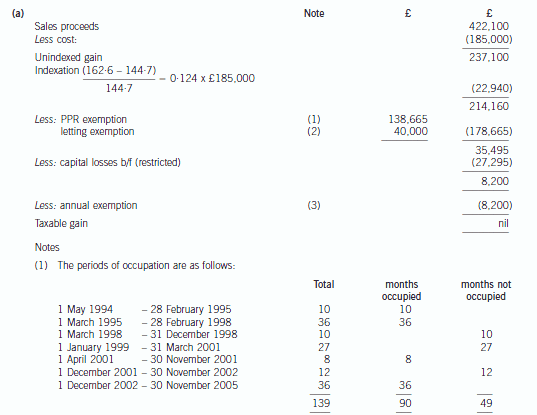广西考生:2020年ACCA国际会计师考试时间是如何安排的?
发布时间:2020-01-10
众所周知,想要获得ACCA证书代价是十分巨大的,不仅仅要花费昂贵的报名费用,而且因为考试科目多的原因还需要大把大把的时间和精力去学习和理解知识点。尤其是对在职人员来说,更是一大挑战者,因此许多考生都因此望尘莫及,目前,ACCA国际会计师注册考试的报名时间和考试时间都依次发布了,51题库考试学习网替大家收集到了今年全部的考试报名时间信息和考试时间信息,希望对大家在了解到考试时间之后,能够合理地科学地备考考试。
首先是2020年ACCA考试报名时间:(建议收藏哦~)

了解完报名时间后,大家可以根据自己的学习能力和时间因素等情况依次可以开始备考了哟(学习能力强的考生可以优先从真题开始做起)
接下来,在认真复习、科学备考的同时,千万不要忘记了考试时间,所以这份是2020年ACCA考试时间表建议大家保存在相册里:


险夷原不滞胸中,何异浮云过太空!以上消息希望对正在准备备战3月份的ACCAer们有所帮助,51题库考试学习网预祝大家考试成功!
下面小编为大家准备了 ACCA考试 的相关考题,供大家学习参考。
1 Stuart is a self-employed business consultant aged 58. He is married to Rebecca, aged 55. They have one child,
Sam, who is aged 24 and single.
In November 2005 Stuart sold a house in Plymouth for £422,100. Stuart had inherited the house on the death of
his mother on 1 May 1994 when it had a probate value of £185,000. The subsequent pattern of occupation was as
follows:
1 May 1994 to 28 February 1995 occupied by Stuart and Rebecca as main residence
1 March 1995 to 31 December 1998 unoccupied
1 January 1999 to 31 March 2001 let out (unfurnished)
1 April 2001 to 30 November 2001 occupied by Stuart and Rebecca
1 December 2001 to 30 November 2005 used occasionally as second home
Both Stuart and Rebecca had lived in London from March 1995 onwards. On 1 March 2001 Stuart and Rebecca
bought a house in London in their joint names. On 1 January 2002 they elected for their London house to be their
principal private residence with effect from that date, up until that point the Plymouth property had been their principal
private residence.
No other capital disposals were made by Stuart in the tax year 2005/06. He has £29,500 of capital losses brought
forward from previous years.
Stuart intends to invest the gross sale proceeds from the sale of the Plymouth house, and is considering two
investment options, both of which he believes will provide equal risk and returns. These are as follows:
(1) acquiring shares in Omikron plc; or
(2) acquiring further shares in Omega plc.
Notes:
1. Omikron plc is a listed UK trading company, with 50,250,000 shares in issue. Its shares currently trade at 42p
per share.
2. Stuart and Rebecca helped start up the company, which was then Omega Ltd. The company was formed on
1 June 1990, when they each bought 24,000 shares for £1 per share. The company became listed on 1 May
1997. On this date their holding was subdivided, with each of them receiving 100 shares in Omega plc for each
share held in Omega Ltd. The issued share capital of Omega plc is currently 10,000,000 shares. The share price
is quoted at 208p – 216p with marked bargains at 207p, 211p, and 215p.
Stuart and Rebecca’s assets (following the sale of the Plymouth house but before any investment of the proceeds) are
as follows:
Assets Stuart Rebecca
£ £
Family house in London 450,000 450,000
Cash from property sale 422,100 –
Cash deposits 165,000 165,000
Portfolio of quoted investments – 250,000
Shares in Omega plc see above see above
Life insurance policy note 1 note 1
Note:
1. The life insurance policy will pay out a sum of £200,000 on the death of the first spouse to die.
Stuart has recently been diagnosed with a serious illness. He is expected to live for another two or three years only.
He is concerned about the possible inheritance tax that will arise on his death. Both he and Rebecca have wills whose
terms transfer all assets to the surviving spouse. Rebecca is in good health.
Neither Stuart nor Rebecca has made any previous chargeable lifetime transfers for the purposes of inheritance tax.
Required:
(a) Calculate the taxable capital gain on the sale of the Plymouth house in November 2005 (9 marks)

Note that the last 36 months count as deemed occupation, as the house was Stuart’s principal private residence (PPR)
at some point during his period of ownership.
The first 36 months of the period from 1 March 1995 to 31 March 2001 qualifies as a deemed occupation period as
Stuart and Rebecca returned to occupy the property on 1 April 2001. The remainder of the period will be treated as a
period of absence, although letting relief is available for part of the period (see below).
The exempt element of the gain is the proportion during which the property was occupied, real or deemed. This is
£138,665 (90/139 x £214,160).
(2) The chargeable gain is restricted for the period that the property was let out. This is restricted to the lowest of the
following:
(i) the gain attributable to the letting period (27/139 x 214,160) = £41,599
(ii) £40,000
(iii) the total exempt PPR gain = £138,665
i.e. £40,000.
(3) The taper relief is effectively wasted, having restricted losses b/f to preserve the annual exemption.
3 Local neighbourhood shops are finding it increasingly difficult to compete with supermarkets. However, three years
ago, the Perfect Shopper franchise group was launched that allowed these neighbourhood shops to join the group
and achieve cost savings on tinned and packaged goods, particularly groceries. Perfect Shopper purchases branded
goods in bulk from established food suppliers and stores them in large purpose-built warehouses, each designed to
serve a geographical region. When Perfect Shopper was established it decided that deliveries to these warehouses
should be made by the food suppliers or by haulage contractors working on behalf of these suppliers. Perfect Shopper
places orders with these suppliers and the supplier arranges the delivery to the warehouse. These arrangements are
still in place. Perfect Shopper has no branded goods of its own.
Facilities are available in each warehouse to re-package goods into smaller units, more suitable for the requirements
of the neighbourhood shop. These smaller units, typically containing 50–100 tins or packs, are usually small trays,
sealed with strong transparent polythene. Perfect Shopper delivers these to its neighbourhood shops using specialist
haulage contractors local to the regional warehouse. Perfect Shopper has negotiated significant discounts with
suppliers, part of which it passes on to its franchisees. A recent survey in a national grocery magazine showed that
franchisees saved an average of 10% on the prices they would have paid if they had purchased the products directly
from the manufacturer or from an intermediary – such as cash and carry wholesalers.
As well as offering savings due to bulk buying, Perfect Shopper also provides, as part of its franchise:
(i) Personalised promotional material. This usually covers specific promotions and is distributed locally, either using
specialist leaflet distributors or loosely inserted into local free papers or magazines.
(ii) Specialised signage for the shops to suggest the image of a national chain. The signs include the Perfect Shopper
slogan ‘the nation’s local’.
(iii) Specialist in-store display units for certain goods, again branded with the Perfect Shopper logo.
Perfect Shopper does not provide all of the goods required by a neighbourhood shop. Consequently, it is not an
exclusive franchise. Franchisees agree to purchase specific products through Perfect Shopper, but other goods, such
as vegetables, fruit, stationery and newspapers they source from elsewhere. Deliveries are made every two weeks to
franchisees using a standing order for products agreed between the franchisee and their Perfect Shopper sales
representative at a meeting they hold every three months. Variations to this order can be made by telephone, but only
if the order is increased. Downward variations are not allowed. Franchisees cannot reduce their standing order
requirements until the next meeting with their representative.
Perfect Shopper was initially very successful, but its success has been questioned by a recent independent report that
showed increasing discontent amongst franchisees. The following issues were documented.
(i) The need to continually review prices to compete with supermarkets
(ii) Low brand recognition of Perfect Shopper
(iii) Inflexible ordering and delivery system based around forecasts and restricted ability to vary orders (see above)
As a result of this survey, Perfect Shopper has decided to review its business model. Part of this review is to reexamine
the supply chain, to see if there are opportunities for addressing some of its problems.
Required:
(a) Describe the primary activities of the value chain of Perfect Shopper. (5 marks)
(a) Inbound logistics: Handling and storing bulk orders delivered by suppliers and stored on large pallets in regional warehouses.
All inbound logistics currently undertaken by the food suppliers or by contractors appointed by these suppliers.
Operations: Splitting bulk pallets into smaller packages, packing, sealing and storing these packages.
Outbound logistics: Delivery to neighbourhood shops using locally contracted distribution companies.
Marketing & Sales: Specially commissioned signs and personalised sales literature. Promotions and special offers.
Service: Specialist in-store display units for certain goods, three monthly meeting between franchisee and representative.
(c) (i) Explain how Messier Ltd can assist Galileo with the cost of relocating to the UK and/or provide him with
interest-free loan finance for this purpose without increasing his UK income tax liability; (3 marks)
(c) (i) Relocation costs
Direct assistance
Messier Ltd can bear the cost of certain qualifying relocation costs of Galileo up to a maximum of £8,000 without
increasing his UK income tax liability. Qualifying costs include the legal, professional and other fees in relation to the
purchase of a house, the costs of travelling to the UK and the cost of transporting his belongings. The costs must be
incurred before the end of the tax year following the year of the relocation, i.e. by 5 April 2010.
Assistance in the form. of a loan
Messier Ltd can provide Galileo with an interest-free loan of up to £5,000 without giving rise to any UK income tax.
3 The managers of Daylon plc are reviewing the company’s investment portfolio. About 15% of the portfolio is represented by a holding of 5,550,000 ordinary shares of Mondglobe plc. The managers are concerned about the effect on portfolio value if the price of Mondglobe’s shares should fall, and are considering selling the shares. Daylon’s investment bank has suggested that the risk of Mondglobe’s shares falling by more than 5% from their current value could be protected against by buying an over the counter option. The investment bank is prepared to sell an appropriate six month option to Daylon for £250,000.
Other information:
(i) The current market price of Mondglobe’s ordinary shares is 360 pence.
(ii) The annual volatility (variance) of Mondglobe’s shares for the last year was 169%.
(iii) The risk free rate is 4% per year.
(iv) No dividend is expected to be paid by Mondglobe during the next six months.
Required:
(a) Evaluate whether or not the price at which the investment bank is willing to sell the option is a fair price.(10 marks)
3 (a) The investment bank is offering to sell to Daylon plc an option to sell Mondglobe ordinary shares at a price no worse than 5% below the current market price of 360 pence. This is a put option on Mondglobe shares at a price of 342 pence. The Black-Scholes option pricing model may be used to estimate whether or not the option price is a fair price. The value of a put option may be found by first estimating the value of a call option and then using the put-call parity theorem.
Basic data:
Share price 360 pence
Exercise price 342 pence
Risk free rate 4% (0·04)
Volatility is measured by the standard deviation. The variance is 169% therefore the standard deviation, σ is 13% (0·13)
The relevant period is six months (0·5)

声明:本文内容由互联网用户自发贡献自行上传,本网站不拥有所有权,未作人工编辑处理,也不承担相关法律责任。如果您发现有涉嫌版权的内容,欢迎发送邮件至:contact@51tk.com 进行举报,并提供相关证据,工作人员会在5个工作日内联系你,一经查实,本站将立刻删除涉嫌侵权内容。
- 2020-03-27
- 2020-04-05
- 2020-04-17
- 2020-03-22
- 2019-05-28
- 2020-03-11
- 2020-04-18
- 2019-03-23
- 2019-08-04
- 2020-03-21
- 2020-03-20
- 2020-02-21
- 2020-01-10
- 2019-03-28
- 2020-08-05
- 2020-01-09
- 2020-05-01
- 2020-01-09
- 2020-04-18
- 2020-01-09
- 2020-04-02
- 2020-03-13
- 2020-01-31
- 2020-03-05
- 2020-02-22
- 2019-07-21
- 2019-01-09
- 2020-01-09
- 2020-03-25
- 2020-02-11